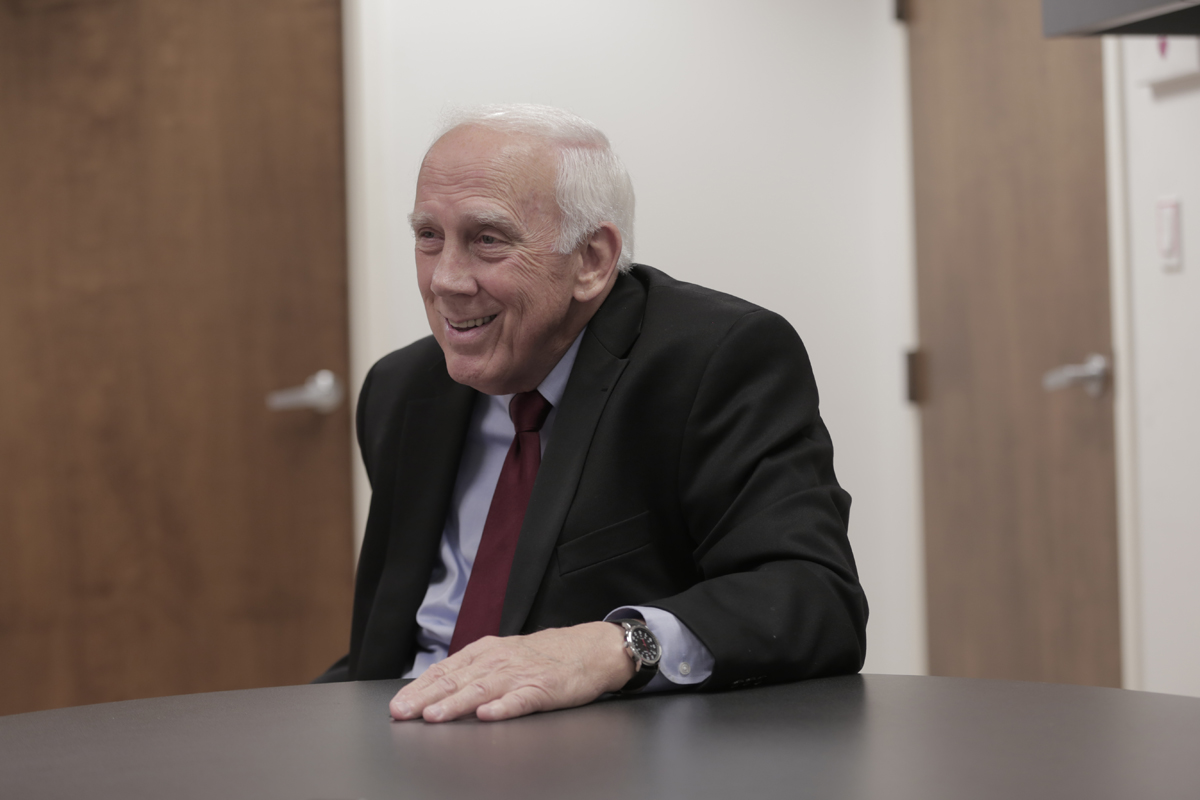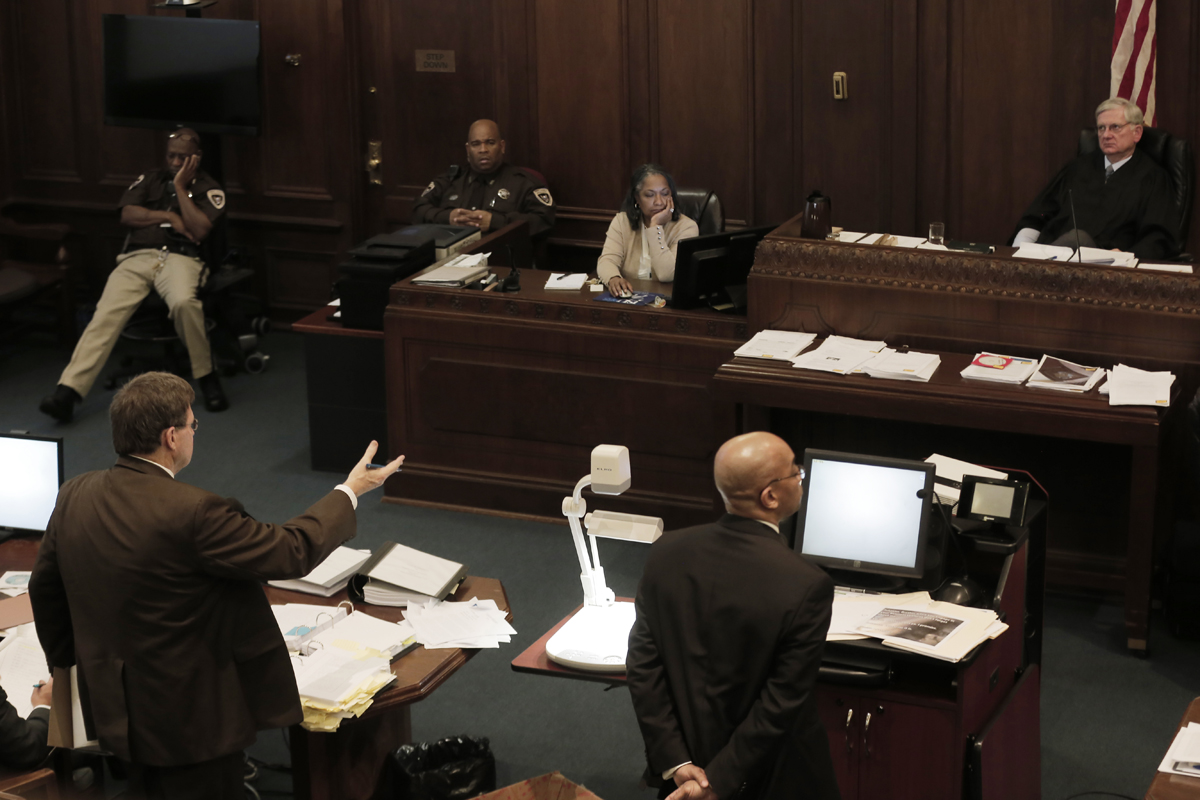![Mayor Tony Yarber peeks under the hood of his 1992 Mitsubishi Mighty Max truck that his family still owns in Subdivision 2 in west Jackson. Photo courtesy Eli Bettiga]()
Tony Tarzel Yarber, 16, waved at his best friend, Lakenya Bolden, as he drove past him in Jackson's Subdivision 2 on Aug. 4, 1994. Bolden was driving into the "Sub" on Wiggins Road, Yarber driving out. They blew their horns at each other.
Friends since kindergarten, the two sophomores at Forest Hill High School were close, and Yarber could not know he would never see his friend alive again.
Bolden and his brother, Karis Jackson, ended up on Deckard Drive on the other side of Wiggins and stopped to talk to some girls. Another group of young men drove up and got out. One of them, Barron Sheriff, reached through the car window and grabbed Bolden's cellular phone. Then, Yarber's friend put the car in park and got out and started fighting with Sheriff.
Levonzel Anderson, a 19-year-old who had only observed until then, went into his nearby house and got a sawed-off shotgun and walked up to the crowd around the fight, loading it as he walked.
Anderson raised his shotgun and fired into the crowd, and then directly at Bolden at a close range of three to four feet. Yarber's best friend died at the scene as Anderson fled. Police later found the sawed-off shotgun leaning against a tree close to the creek bed in the woods near Deckard Drive. He hid from cops for several weeks but was eventually apprehended. He was tried and convicted of murder in Hinds County Circuit Court and sentenced to life.
The death of Yarber's friend made death a brutal reality for him. "Lakenya was a good kid, a funny kid. He was a teacher's worst nightmare, but a best friend is a best friend," Yarber said during a JFP One-on-One conversation at Millsaps College on June 20, 2016. "I still think about how Ms. Carney would give him a paddling to start off the day because she knew she would have to give him a paddling anyway."
Bolden was the first person Yarber knew personally who had been murdered, although he would later see dead bodies as a teen growing up during the crack era of the 1980s and early 1990s in the Sub in west Jackson. "It did something to me. I still think about his quirky ways," Yarber says now of his buddy. "He was the first person I knew ... that had been killed that I loved and ... I would miss."
'I'm gonna call the po-lice!'
Crack cocaine infected much of west Jackson, including near the Yarber family home on Dewey Street in Sub 2 on the west side of Wiggins. But Delores Yarber wasn't having any of the nonsense.
Mrs. Yarber was 5 feet and 11 inches tall and weighed about 200 pounds. She would stand in the middle of the street with her clunky camcorder resting on her shoulder and yell at them to get off her block.
"I'm gonna call the po-lice!" she would yell, and sometimes she would.
Mrs. Yarber, now 69, still likes to sit on her porch at the house the mayor grew up in, keeping her eyes on the streets of the neighborhood that backs up into a wooded area against Interstate 20 that cut the Westside community in half back in the 1960s.
"I'm not trying to control things," she said during a summer visit by her son and the Youth Media Project, "but it's just the way we are in these houses."
Members of her tightknit family live nearby, often popping in and out of her house and yard, where Yarber stopped on this visit to look under the hood of his 1992 Mitsubishi Mighty Max truck that the family still owns. His face lit up as he described how tricked out it was when he used to drive it, with 15-inch deep-dish rims, four 15-inch woofers, two subs and two tweeters on the inside, among other features.
His father, George, whose family helped settle this part of the Sub, grew up in the neighborhood that "the Crisler brothers" developed for black people starting in the 1930s. His dad died when he was 22, but the mayor's family can easily visit his father's oldest sister, Gloria Brimage, who lives nearby and who, now and then, tells off her mayoral nephew over how he's doing his job. Yarbrough Street is a few blocks away; that's the more European way a different family member chose to spell their name, the mayor said, because somebody got in trouble, and ended up changing the spelling. "Then another one left ... well, that's a family secret," the mayor said, laughing, during the YMP visit.
Mayor Yarber, now 38, is quick to say his strong two-parent family helped keep him out of trouble during a time when it surrounded him.
But Yarber doesn't judge those who don't have that stable family. "That's not necessarily everyone's testimony," he said at the Millsaps conversation.
"It is easy for us to say, 'Well, the parents,'" Yarber continued. "That's a great way for us to pass it off, and then it isn't an issue of the village. Then it is an issue of who lives in the hut."
The mayor emphasized that many parents want to do better, but don't have the resources. "We can't just get into this mode or idea of, 'Where are the parents?'" Yarber said. "Their parents are there a lot of the cases, but (in) a lot of cases, the parents just aren't us. And they don't have access to a lot of things we have."
'Cocaine Being Rocked Up'
Yarber may have had a strong family, but he still could have turned the wrong direction. He and Bolden spent their adolescence surrounded by crack and guns, as a white tax base was fleeing a newly integrated city. That flight and crime wave left a deepening poverty, worsened by the loss of potential breadwinners to drugs and prison. Yarber's uncle was even addicted to crack.
"I remember everything about it," Yarber said of the crack era during the June 15, tour with YMP student journalists. "I remember, alright. I remember an uncle who would steal everything that wasn't tied down. I remember beautiful women who we all adored and idolized within the neighborhood who, within a year, you wouldn't even know who they were because of what they had done to their bodies."
America's crack era—when many poor African Americans were swept into an epidemic fueled by the cheaper form of cocaine from the mid-1980s to mid-1990s—was a time when Jackson murders averaged from 80 to 90 a year, Yarber said; now, the city sees about a third of that number a year. Crack also brought economic devastation and decay to communities like the Sub, the Washington Addition and others.
"People that, you know, we looked up to and considered to be some of our idols, men, they went from that to begging us for money. We're kids. 'Gimme five dollars, little brother,'" Yarber said.
Although friends who were involved in drug gangs tried to draw Yarber into selling crack—he even held crack on the corner—he said he was never tempted to actually sell it, partly because he didn't share the same literal hunger and struggle of some of other kids.
"My parents provided extremely well," he said. "Both of them were there."
Still, Yarber's friends would create crack and sell it right in front of him. "Even now I can still walk into places and smell scents that remind me of cocaine being rocked up," he said at Millsaps College.
Yarber knows he was lucky he wasn't swept up anyway. "[I]f the police had come, all of us would've gone to jail," he said.
That is a reality of young people from drug-infested Jackson neighborhoods: If someone messes with them, the police will arrest everyone involved. And during the crack apex, black users and sellers got much harsher sentences than users of higher-grade cocaine, who were often white. The federal Anti-Drug Abuse Act of 1986 required that distributing just 5 grams, or a thimbleful of crack, bring a five-year mandatory sentence, while it took 500 grams of regular cocaine to trigger the same sentence.
Although the crack epidemic is not what it was then—usage and sales fell dramatically in the late 1990s—crack is still one of the drugs that devastates parts of Jackson, along with sales and use of meth, pot and, increasingly, heroin, police say.
Firearms are still prevalent, if not more so; with the state's liberal gun laws, it's hard to take firearms off the streets, Police Chief Lee Vance says, and many young people carry them for self-defense.
Gun violence victimizes young men of color more than any other group in the United States, and those who carry them to defend themselves often end up dead or in prison for using them.
Yarber is not unlike many young people growing up now in neighborhoods like the Washington Addition, the Brown Bottom, the Virden Addition or parts of Sub 2; his police chief, Lee Vance, grew up in the Wood Street area, long notorious for drug and gang activity. Yarber said he remembers seeing seven or eight dead bodies within 15 to 20 feet of him before he turned 13. "By junior high, it was almost numbing that people you knew could get killed, and you not see them the next day," he said.
Traumatized Children
In 2000, one of Tony Yarber's first cousins was shot 17 times. He was a father and a good provider who was suddenly missing from his children's lives.
"I did his eulogy. He was a year older than me," Yarber said at Millsaps. "What I noticed specifically is that he had six children. All six of those children were left without a father to provide. Those children were traumatized."
The trauma of losing parents to violence and prison, as well as being close to as much bloodshed as the mayor and probably the majority of black men and women in Jackson have been, can contribute directly to the ongoing cycles of violence, experts say. Young people who witness repeated community violence are two to three times more likely to suffer from post traumatic stress syndrome, which leads to depression, substance abuse, behavioral disorders, inattention (often misdiagnosed as ADD) and more violence, Dr. Denise Sherrington, a New Orleans-based trauma expert, reports. Adults must not "normalize" children's trauma, she warns. Instead of leading with "What's wrong with our youth?," Sherrington suggests, "ask "What happened to our youth?" She also added during a presentation in New Orleans that praying for kids with PTSD isn't enough; they need treatment and policies to prevent "re-traumatization."
Many public-health experts believe at-risk youth are best helped by "credible messengers" (also called "trusted messengers") who have seen what they've seen, and maybe have served time in the system and still managed to rebuild productive lives. That messenger isn't likely to look down at the kid, or even the family, knowing how the cycle actually ensnares kids.
Kai Smith, a Harlem, N.Y., gang and violence expert who had six felonies and now has six degrees, feels strongly that young people suffering from the trauma of community violence and low expectations, mixed with absence parenting, first need to be "habilitated" before they can be rehabilitated. He has done that in public schools and New York City's jail, Riker's Island, by mixing straight talk with high expectations, he said on a trip to Jackson.
Regina Briggs, 52, is also a credible messenger. She was in the audience at Yarber's talk at Millsaps and revealed afterward that she got involved with the Black Gangster Disciples when she was a teenager in Chicago. It took mentors to help her get through it, she told the Youth Media Project in an interview.
Her teenage years were traumatic, but she finally got out of Chicago and met a mentor, and a philanthropist, who helped her get on a better track. "Always have somebody you can talk to about anything," she said. "It doesn't have to be a parent, but just someone you can trust. Also surround yourself with people who motivate you and bring positive energy into your life."
Briggs said it's tough to break the cycle, though. "What's going on in Jackson is similar to what was going on in Chicago when I was younger," she said. "I believe Mayor Yarber has a lot on his hands."
Yarber told a story of a young man who tried to break into his house as his friend was breaking into his car. "You know, me being foolish and young at the time, I started chasing them, and one of the guys and myself, we fight," Yarber said.
But the real story was the young man's past. "His caseworker said that something very similar had happened to this kid maybe two months ago. ... The fact that he would continue to try to stay in the same life and do the same things means that he was desensitized. ... What do we do to make people less callous about these things?" Yarber said.
It is about figuring out the problem, and then monitoring the intervention, the pastor and former principal said. "The approach to crime is no different than the approach to a kid that's having learning disabilities in school," he said. First, comes a conversation to assess the child's strengths and weaknesses. Then, he said, "I identify which of those weaknesses deserve priority."
"How do we scope and sequence those? Do some of the interventions need to be parallel, or do I scalpel those? And in doing that, you prescribe the intervention, and you monitor progress overtime to make sure that you got exactly what you need."
The weakness, the mayor added, is in sustaining efforts to help young people survive the trauma and change their life course. "We've gotten pretty good at prescribing. We have not been so good at progress monitoring, because we've been more excited about saying that we're doing the good work than measuring the work we're doing," he added. That is, the solutions tend to be patchwork at best.
Still, dealing with trauma, which often leads to more violence, should be non-negotiable, if for no other reason than the threat it poses to others, Yarber said, referring to the children of his cousin he eulogized. "Six lives with the potential of that trauma, being exponentialized over whatever community they're living in; the effects could be felt there," Yarber said.
'What Are Their Risks?'
"This used to be one of the two barbershops out here," the mayor said, pointing as the Jackson Fire Department bus turned back north onto Wiggins Road after leaving his parents' house. "Of course, everything out here was black-owned." Except, he added, that one store by a white man, Mr. Garrett. And then there was a store that was Indian-owned at one point that he sheepishly admitted folks in the neighborhood called the "Jew-man store."
"Nobody knew any better," he said.
But by now, few local businesses remain in Sub 2, nor in many majority-black neighborhoods in the city. The Metrocenter Mall was a victim of white and economic flight, and crime fears—even though it is still there, with far fewer businesses. But all the city's movie theaters closed or followed flight to the suburbs. That leaves teens little to do, and few jobs they can easily get to.
"Well, it definitely hurts job potential. ... We're going to pass a brand-new store that they just built here and, typically and I guess you can't blame them, but they're primarily owned by East Indians, and their family members work there," the mayor said. That means they don't hire many young people from the neighborhood, a problem majority-black communities face around the nation. "And typically if they do, it's probably somebody who kind of cleans up or something; you know, they give them a few dollars to clean up."
"The opportunities aren't there."
That means that it is hard for families to keep their kids off the streets and learning job skills, much less to build wealth and credit, and it is more likely that their children turn to crime, either stealing to get what they don't have—like shoes or cell phones—or to get money to buy food, as many children in poor parts of Jackson do. Or they might get pulled into the drug trade, where violence often follows. It can be hard to say no when you're young, hungry, and have few opportunities and nowhere safe to spend your time.
Compounding the jobs problem, Yarber said, is transportation problems, from a continually under-funded bus system to people who can't afford cars and gas.
"Our Achilles heel in terms of service delivery is transportation," Yarber said on the bus in June. "It is the most embarrassing conversation that I have with staff on a weekly basis. The most embarrassing."
That means young people can't get to jobs, and older people can't get to their doctors' appointments, Yarber said. He admitted that he had come into the job with "this huge vision of creating a more modern transportation system," but realizes now they had "grossly under-estimated the state of dilapidation of the fleet."
What lack of funding and organization ultimately means for young people at the highest risk of committing crime in Jackson is that they don't get the "wraparound services" they need to steer them a different direction and interrupt the cycle of violence. "You've got to drill down and ask questions. What are their risks? And then you determine what the interventions are to those risks," the former principal said.
"And that hasn't been done."
'Put Them on Some Jobs'
As the bus crept slowly through the streets of the Washington Addition on that hot day in June, Yarber suddenly had the bus stop in the middle of a street. The mayor got out and started interviewing people who stopped by about what needed to happen to reduce crime in the Addition.
"We need to find more for them to do and everything," said one middle-aged man. "(Help them) go back to school, get your education, work programs, try to help them get jobs so they can have money in they pockets."
Suddenly, 21-year-old twins Stephen and Steffon Butler—former star basketball players at Jim Hill High School who got in trouble and, thus, didn't finish—came out of a corner store and walked over to greet the mayor. The two young men, former Vice Lords, are part of a group called Undivided that former drug dealer and felon John Knight—a credible messenger—started in the Addition to get young people to not follow in his path and to put them to work cutting grass and doing other neighborhood jobs so they don't resort to drug dealing or stealing if they don't have jobs.
As the twins left, Yarber continued interviewing people about what was needed to stop crime there. "Get them interactive with the law enforcement, getting them to meet them, and hey, this can be a career that you can go in, and you know, let 'em know that," another resident suggested.
"That's a good idea!" Yarber said.
"Yeah, cuz you know we been having a lot of negativity about our police department and everything, so hey, all of them ain't perfect, but hey, if (cops) know the people in the neighborhood and the young folks in the neighborhood, that builds a stronger relationship," the resident continued.
Another one offered, "Like a lot of these yards that need to be cut and everything, we just, we do that there and help build them some career-development skills to help them get ..."
"... skills, trades?" Yarber interjected.
"Yeah, some skills, some trades, and after that there, see if we can get them and put them on some jobs."
"OK, alright," the mayor responded, adding that the City had started a program called Jackson 500 Workforce Development Program, working with Hinds Community College and Working Together Jackson, to teach Jacksonians "trades" like plumbing and welding. Applicants don't need a GED or diploma to be accepted. "Two guys actually were homeless, and they're actually staying on campus at Hinds now," Yarber said. "But we've got to figure out a way to get more people involved in it and to pay for the folks. Right now I think it's about 70 people we got engaged."
Contrary to myths, people in areas like the Addition do want to work, Yarber adds, and they want to learn skills.
"If we talk to 25 people, you may have two who have turned down an opportunity to go to school for free. You may. And I don't mean math, reading and English. I'm talking about an opportunity to go to take some kind of trade," he said.
The Vital 'Wraparound' Net
"Opportunities, education" are answers for neighborhoods like the Washington Addition, Yarber said, as the bus again eased forward. The mayor then connected the dots on what is needed to get there: First, pre-K kids need a quality early-childhood program that increases their ability to read when they enter kindergarten.
Then, "if they have that ability to read by third grade, of course, and they're at or above grade-level, the sky's the limit. We get them in a high school that offers them both college and career-readiness opportunities because everybody's not interested in going to college." They get job training, and then put into a job. Through the process, the young people may need mental-health or substance-abuse services right in the community, he said.
That "wraparound" approach may sound simple, but it is tough with under-funded schools in areas where the majority of children live in poverty—a key crime precursor—such as at nearby Jim Hill High School, and a state Legislature that defends less funding for schools with the biggest academic challenges by pointing to more affluent schools as a reason that money is not needed to improve schools.
"So education is going to open the door to opportunities. ... We've got to create a stronger feeder system over here," said Yarber, who has degrees from University of Southern Mississippi and JSU. "The system for this area has to be functional. We can't just have a great elementary program but not have a great middle program. We must have a great middle program, a great high school program, and then most importantly, there's got to be some kind of cohesive systemic pre-K program that's able to feed into these elementary schools so they have a chance of making it."
Once those doors are open and the necessary educational pieces are in place, it will unlock opportunities for children of color who now just don't have access to them. "See right now, if you quit school in 10th grade, and you quit because you never been successful anyway, then you don't have a whole lot of opportunities," Yarber said.
"There ain't a whole lot for you to do other than sell dope or sell other things that aren't legal, so we've got to make sure that we create a successful feeder program for Washington Addition."
"Of course," Yarber added, "everything is about money, but there are enough people in the city, in the communities, who do this stuff professionally anyway, somewhere. They can actually create cooperations that offer those opportunities, too, whether it's a couple of nights a week through volunteerism, through philanthropy. I think it's there, but how we put all of it together, how we pull all this pie-in-the-sky that I'm talking about down to the ground, you know, it's not something that's going to happen overnight."
The 225 Most At-risk Teens
By the time the bus carrying Yarber and the Youth Media Project arrived at Lee Elementary in south Jackson, Yarber was talking about the worsening problem of crime in that part of town—a "microcosm" of demographics, with black, white, Asian and Latino citizens.
"Lee Elementary for years was one of the lowest-performing schools in the city," Yarber said, standing in the heat outside the bus as a YMP video and photography team surrounded him like paparazzi. "They got some different leadership here now, and I think that they're doing a lot more community engagement kinds of things, and so they're actually turning that around."
It's also a more dangerous community now than it used to be. "Precinct 1 has really started leading the way in crime reduction," he said, "but the crime was so high that—I don't want to say this the wrong way because I don't want to make my chief mad—but how relevant is that data to the people who live in these houses, right?"
A January 2016 report about the precursors of Jackson crime by BOTEC Analysis Corp., commissioned by Attorney General Jim Hood and paid for by the state Legislature, showed that Wingfield High School in south Jackson is leading the other city's other high schools in percentage of students who have been charged with a serious offense (6.9 percent), a very serious offense (1.4 percent) or served time in the adult criminal-justice system (12 percent).
One problem is poor re-entry after prison. "Statistically, a vast majority of those folks who are returning to the city from having done crime, having done time—over 50 percent of them—are in south Jackson. That's real-life re-entry data," Yarber said. "So if we've got 600 folks that are returning to the city (from prison) every year, over half of them are in south Jackson."
Dealing with re-entry—helping former criminals get jobs and start over—is a challenge tat Jackson doesn't meet very well, Yarber said. It a coordination problem—"in silos, they're doing good work"— but without an overall map of who is doing what for which person leaving the system.
That means many ex-cons slip through the cracks without proper help to avoid resorting back to crime. Many of them end up re-offending, often with worse crimes, especially if they cannot get a job and support themselves or their families, thus extending the crime cycle.
BOTEC reported on the re-entry problem. "Educational programs appear to be limited," it warned. "Programs are available to provide school for juvenile inmates and there are programs to get a GED ... However, not all inmates can get into the program, and equipment is lacking."
Yarber points to the City's Fresh Start program to put some previous offenders back to work, but it's not enough, he said. That is a primary reason that he convened the City of Jackson Criminal Justice Report Taskforce this summer to take a systemic look at the holes in the net and come up with recommendations to plug them. "This re-entry task force, it features folks from the federal system, the state system, local agencies." They had regular meetings in police headquarters downtown and have issued preliminary recommendations.
"But we just haven't figured out, yet, how to just create this seamless re-entry program that gets folks back to work, gets folks training, but folks are doing good stuff," Yarber said.
The BOTEC report found that such coordination is sorely lacking in Jackson, meaning that too many young people who could be saved end up committing crime. The strongest predictors, it found, are in children who have failed a grade, dropped out, or been chronically absent from school, or who have been involved in the criminal-justice system. Using those risk factors, researchers drilled down into the 30,000 students enrolled in Jackson Public Schools, and predicted that 5 percent, or 1,500, would be arrested at some point; 2.2 percent, or 660, for a serious crime like drug dealing or robbery; and .44 percent, or 132, for a very serious crime such as murder, manslaughter or rape.
Researchers advised, however, that an organized effort to focus "wraparound services" on "a target efficiency group" could use the top two indicators—drop-outs and school absence, and juvenile and criminal arrests—to narrow the list of young people in the needed "treatment population" down to 225 JPS students. Many of those are in the four high schools with the highest percentage of those who commit crimes—Wingfield, Lanier, Provine and Jim Hill. Those schools also have high rates of poverty among the children who attend them, which is a key crime indicator.
The mayor said Jackson must get organized enough to target kids at the highest risk, who don't always get the services they need. "One of the things I think the (BOTEC) report didn't do is it didn't drill down beyond saying they were at risk," Yarber said. "So then you've got to drill down and ask questions about what are their risks. Then you determine what those interventions are. And that hasn't been done."
Yarber hopes his task force's findings will help lead to specific ways to reach and redirect those 225 young people. "So those 225 that we're talking about. Not only must they be identified here, but ... then there must be a specific strategic intervention put in place," Yarber said at Millsaps College.
In a systemic way that has probably never been done in Jackson, Yarber's task force has identified problems from lack of mental-health services, to overcoming media perception about crime, to lack of re-entry services, to economic causes of family breakdown, to lack of parental guidance and accountability for juvenile offenders.
The BOTEC report agreed that "deficiencies in family structure," "weak bonds," lack of social capital" and "low supervision" are important, but strongly recommended getting past blaming parents or anyone else. "This study tracks the 'life course' followed by individuals from childhood into and out of the public schools, veering into early encounters with law enforcement and then the juvenile justice system, and finally into incarceration as a result of serious, often violent crimes," BOTEC stated.
The answer is getting organized and taking actions to fill the gaps, it warned. "Rather than dwelling on the incendiary issue of who is to blame, the (attorney general) has asked us for solutions that could interrupt the status quo, which currently generates an intolerably high crime rate."
'The Same Cycles of Loss'
Young people in Jackson's most challenged neighborhoods often don't "live" in one place for very long; instead they bounce around from place to place, often staying with only one or no parent due to the long cycle of poverty, drug abuse and selling, violence and incarceration that destroys families. (Many with federal charges are sent out of state, too far for families to visit.) Many young Jacksonians tell similar stories.
"My mama was smoking (crack) so she wasn't stable at all," one parolee told BOTEC researchers. "... [M]y grandmamma, she'll get tired of it and whatever and send me off to my auntie, then I'll go stay with my mama when she get halfway straight. Then she don't be all the way straight so I'll have to go back and live with my grandmamma. Something like that."
The cycle usually repeats itself, and then often spreads to offspring, if not interrupted. "[M]any participants in this study were repeating the same cycles of loss that they had experienced as children; having lost their own parents to incarceration, they were now separated from spouses and their children," BOTEC reported.
It's a cycle that can seem hopeless, especially in a city with as few resources to stop it as Jackson. The mayor can seem frustrated at the enormity of the task, even as he tries to get the agencies organized to deal with it. "After you do a $500,000 study to say what the issue is," he said during the bus ride with YMP, "there also needs to be some money (to deal with it)."
Yarber wants all the programs in the mix evaluated well. "I don't really think that we've been able to capture best practices, because we haven't been able to look at the best data because we haven't had programs that are structured well enough to do that," he said. When he arrived in City Hall, Yarber added, "there were a lot of studies done and on those shelves."
Ignoring the best research also means that the default answer to crime in Jackson, is increased police presence and incarceration. That's a mistake, BOTEC warns, especially for juveniles: "Corrections do not provide correction." In fact, incarceration is a key indicator for recidivism—re-offending, and often for worse crimes.
Since the 1970s, BOTEC reports, the United States has preferred punishment over rehabilitation, which in turn means that prisoners and thus ex-offenders typically show "low educational attainment, unemployment, substance abuse, mental-health problems and relationship instability."
Contact with the criminal-justice system is especially bad for kids, and ultimately the community at large.
"Juveniles who spent time in correctional facilities are more likely to drop out of high school and be on public assistance later in life," BOTEC warned. "Boys who were locked up are less likely to desist from criminal activities in adulthood and have significantly more problems associated with alcohol abuse. Girls who are incarcerated are more likely to become single parents, drop out of high school, and suffer from the effects of poverty and mental distress."
Not to mention, criminal activity is common within Mississippi's jail and prison walls. "Illegal stuff going on here affects me," one female inmate told BOTEC.
"I don't want to be punished for something I haven't done."
Corrections Don't Correct
The negative effects of the criminal-justice system don't happen just inside detention-center walls; they occur right on the streets in Jackson's neighborhoods, the city's young people say.
Marzavier "Zeakyy" Harrington, now a Youth Media Project student journalist, writes about a cop punching him in the stomach while he was in handcuffs last year when he was 16, after his friend flipped off the police.
Young Jacksonians often see police arrest everyone involved in a fight rather than investigating to find the ones who attacked other young people. These kinds of blanket police responses and assumptions that certain kinds of young people are guilty and hopeless, a policing attitude not unique to Jackson, prolong historic distrust between officers of all races and people of color.
Instead, Yarber said, Police Chief Lee Vance wants to help lead his officers into a real "community policing" approach to get to know the young people of the neighborhoods—and to help them.
That is, instead of arresting them from flipping off the police, try to get to know them and steer them a different direction.
Chief Vance said at his own JFP One-on-One Conversation at Millsaps College on May 10 that even as a child, he knew police often overreacted and used intimidation tactics. "My philosophy is the community-oriented perspective," Vance said. Traditionally, community policing means that officers get out of their cars, walk the beat and get to know citizens, including troubled young people, building trust.
"We talk about this stuff weekly, daily, in roll calls," Vance said at Millsaps. "Don't get the wrong impression: We're going to enforce the law, (but) a violent episode doesn't have to occur every time you arrest somebody. As police administrators, it's up to us to say, 'This is how we're going to operate. If you don't want to operate like this, you should probably go somewhere else.'"
Better trust, and the belief that law enforcement officers are treating them fairly, can lower crime in an at-risk population, BOTEC reported.
"Police officers and folks who are in that position of trust need to really work to have those kind of opportunities," Yarber said at Millsaps College.
Yarber emphasized that adults helped him get second chances when he messed up as a kid. Once after he was involved in a gang fight, cops came to his school to get him. But the principal stood up for him, and they let him go." Still, the mayor came dangerously close to entering the system, which BOTEC reports would make it more likely that he kept re-offending.
That's why the 225 kids and others need caring adults to stand up for them, Yarber said. "It is not necessarily the issue of the village, but it is definitely an issue of people who are in contact with you," Yarber said. "We just have to get to a place where we get out of our bubble."
Yarber used himself to make the point that young people in neighborhoods like Sub 2 can easily go "good" or "bad," and sometimes it comes down to whether they were swept up into the criminal-justice system at an early age or managed to avoid it.
"The only reason I am the mayor is because I didn't get caught. And that's just me being real. It's not that I was just so good; it's just that I didn't get caught doing stuff," he said. "It's just that when I was standing on Turner and Dewey (streets) holding crack in a Tylenol bottle, they didn't stop me. That's how come I am the mayor."
Also read: "Solutions to Heartbreaking Violence"
Additional reporting and interviewing by Ryan Perry and Donna Ladd. Members of the 2016 Mississippi Youth Media Project (youthmediaproject.com) produced this story. Read a longer version on their journalism site, jxnpulse.com. Email info@youthmediaproject for information on how to publish the students' work, as well as how to help and mentor YMP students and help sponsor the Youth Media Project. Read the JFP's "Preventing Violence" series at jfp.ms/preventingviolence.



























